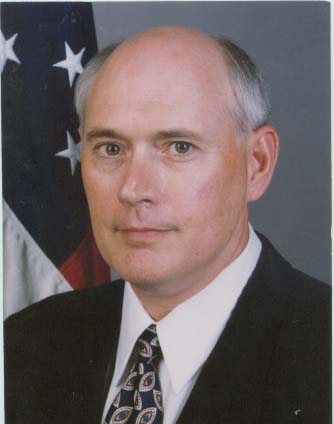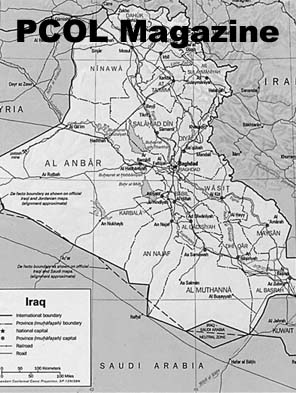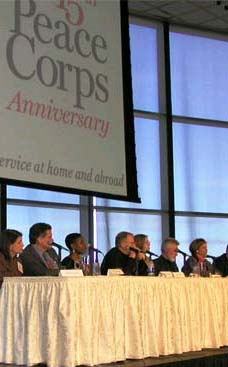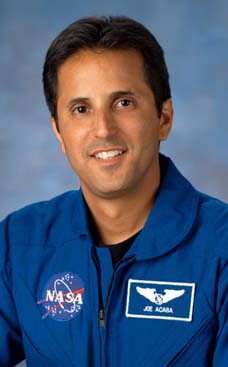2006.03.07: March 7, 2006: Headlines: Figures: COS - Tunisia: Diplomacy: Springfield State Journal Register: Hull says patience will win war on terrorism
Peace Corps Online:
Directory:
Tunisia:
Special Report: Diplomat Edmund Hull:
April 4, 2005: Index: PCOL Exclusive: RPCV Edmund Hull (Tunisia) :
2006.03.07: March 7, 2006: Headlines: Figures: COS - Tunisia: Diplomacy: Springfield State Journal Register: Hull says patience will win war on terrorism
Hull says patience will win war on terrorism

"It is my judgment that the most significant reason why we didn't see a repeat of the Sept. 11 attacks in the United States was because of these efforts in Afghanistan and abroad. It put al-Qaida on the run, so round two was a victory for the United States and its allies," he said. Edmund Hull served as a Peace Corps Volunteer in Tunisia and as Ambassador to Yemen.
Hull says patience will win war on terrorism
Hull says patience will win war on terrorism
Former ambassador to Yemen visits UIS
By AMANDA REAVY
STAFF WRITER
Published Tuesday, March 07, 2006
Patience and the resilience of the American people will be required to triumph over al-Qaida and other terrorist organizations, according to Edmund Hull, a Springfield native and former U.S. ambassador to the Republic of Yemen.
"The only way terrorists can win is if we allow ourselves to be terrorized," Hull told a packed Brookens Auditorium Monday night during a World Affairs Council of Central Illinois presentation at the University of Illinois at Springfield.
A 1967 graduate of Griffin High School, Hull is the lecturer of international affairs, diplomat in residence at the Woodrow Wilson School of Public and International Affairs at Princeton University. His topic Monday was "The War on Terrorism: Who is Winning?"
Hull's career in the U.S. Foreign Service includes more than 20 years' experience in the Middle East, in Jerusalem, Cairo, North Africa and the Arabian Peninsula and with the United Nations. He also served as the United States' acting/deputy coordinator for counter-terrorism from 1999 to 2001, during which he spurred implementation of the U.N. Security Council resolution that imposed an arms embargo on the Taliban for its support of al-Qaida and managed the transition of counter-terrorism affairs from the Clinton to the Bush administration.
Hull discussed the idea of the war on terror and how terror is not an adversary but a tactic. He said it's important to focus on the organizations and networks that utilize terror tactics, explaining the "war on terror" to be a war against al-Qaida and its networks.
Hull likened the battle to a 15-round boxing match, describing round one as al-Qaida's formation during the Soviet Union's occupation of Afghanistan and culminating in the Sept. 11, 2001, attacks on the World Trade Center and the Pentagon.
This round was a clear victory for al-Qaida, Hull said, as the organization successfully conducted training and recruitment in remote Afghan camps, formed an alliance with the Taliban and established a sophisticated network throughout the Middle East and Europe.
The Sept. 11 attacks became a defining moment for the current Bush administration and opened the doors for counter-terrorism efforts that were previously a back-burner issue, Hull said.
Therefore, the second round of the "war on terror" found the United States eliminating al-Qaida sanctuaries and training camps in Afghanistan during Operation Enduring Freedom.
Key leaders of the organization also were captured during this round, and the terrorists' financial networks were cut off, leaving them struggling to fulfill planned attacks, he said.
While the U.S. government was reluctant to use force against al-Qaida before the Sept. 11 attacks, that's no longer the case.
"It is my judgment that the most significant reason why we didn't see a repeat of the Sept. 11 attacks in the United States was because of these efforts in Afghanistan and abroad. It put al-Qaida on the run, so round two was a victory for the United States and its allies," he said.
The country is now involved in the third round of the "war on terror," Hull said, and so far, there is no clear winner.

This round consists of the U.S. government shifting its focus from Afghanistan to Iraq and a perceived threat of weapons of mass destruction, which many in the counter-terrorism community saw as a strange choice, Hull said. "The occupation of an Islamic country is a spur to further terrorism," he noted, explaining that the conflict in Iraq is likely to produce a new generation of terrorists the U.S. government will have to deal with.
Today, Hull said, al-Qaida has become a network of autonomous or semi-autonomous cells, as seen in the train attacks in Madrid and the subway bombing in London last July. He also said that European Muslims who feel disenfranchised make the continent a fertile place for terrorist recruitment, and that al-Qaida is effectively using cyberspace to communicate and disperse information and technology.
According to Hull, the U.S. government should remain on the offensive and form anti-terrorism partnerships with its allies. Foreign governments can be more effective against combating terrorists on their own land because they are knowledgeable of the area, its resources and the language, he said.
Hull also emphasized the need for direct diplomacy and independent governance in the Middle East. In addition, the Unites States must be wary of alienating its own Islamic communities, he said.
And U.S. citizens must engage in both physical and psychological hardening by not only fortifying potential terrorist targets but our own willingness to take precautions as well.
"We need to be aware of what's going on, take prudent precautions and then go ahead with our lives," Hull said.
Amanda Reavy can be reached at 788-1525 or amanda.reavy@sj-r.com.
When this story was posted in March 2006, this was on the front page of PCOL:





Peace Corps Online The Independent News Forum serving Returned Peace Corps Volunteers
 | History of the Peace Corps
PCOL is proud to announce that Phase One of the "History of the Peace Corps" is now available online. This installment includes over 5,000 pages of primary source documents from the archives of the Peace Corps including every issue of "Peace Corps News," "Peace Corps Times," "Peace Corps Volunteer," "Action Update," and every annual report of the Peace Corps to Congress since 1961. "Ask Not" is an ongoing project. Read how you can help. |
 | The Peace Corps Library
The Peace Corps Library is now available online with over 40,000 index entries in 500 categories. Looking for a Returned Volunteer? Check our RPCV Directory. New: Sign up to receive PCOL Magazine, our free Monthly Magazine by email. Like to keep up with Peace Corps news as it happens? Sign up to recieve a daily summary of Peace Corps stories from around the world. |
 | Peace Corps suspends program in Bangladesh
Peace Corps Director Gaddi H. Vasquez announced the suspension of the Peace Corps program in Bangladesh on March 15. The safety and security of volunteers is the number one priority of the Peace Corps. Therefore, all Peace Corps volunteers serving in Bangladesh have safely left the country. More than 280 Peace Corps volunteers have served in Bangladesh since the program opened in November 1998. Latest: What other newspapers say. |
 | Invitee re-assigned after inflammatory remarks
The Peace Corps has pulled the invitation to Derek Volkart to join the Morocco Training Program and offered him a position in the Pacific instead after officials read an article in which he stated that his decision to join the Peace Corps was in "response to our current fascist government." RPCV Lew Nash says that "If Derek Volkart spoke his mind as freely in Morocco about the Moroccan monarchy it could cause major problems for himself and other Peace Corps volunteers." Latest: Volkart reverses stance, takes new assignment in Paraguay. |
 | March 1, 1961: Keeping Kennedy's Promise
On March 1, 1961, President John F. Kennedy issues Executive Order #10924, establishing the Peace Corps as a new agency: "Life in the Peace Corps will not be easy. There will be no salary and allowances will be at a level sufficient only to maintain health and meet basic needs. Men and women will be expected to work and live alongside the nationals of the country in which they are stationed--doing the same work, eating the same food, talking the same language. But if the life will not be easy, it will be rich and satisfying. For every young American who participates in the Peace Corps--who works in a foreign land--will know that he or she is sharing in the great common task of bringing to man that decent way of life which is the foundation of freedom and a condition of peace. " |
 | Paid Vacations in the Third World?
Retired diplomat Peter Rice has written a letter to the Wall Street Journal stating that Peace Corps "is really just a U.S. government program for paid vacations in the Third World." Director Vasquez has responded that "the small stipend volunteers receive during their two years of service is more than returned in the understanding fostered in communities throughout the world and here at home." What do RPCVs think? |
 | RPCV admits to abuse while in Peace Corps
Timothy Ronald Obert has pleaded guilty to sexually abusing a minor in Costa Rica while serving there as a Peace Corps volunteer. "The Peace Corps has a zero tolerance policy for misconduct that violates the law or standards of conduct established by the Peace Corps," said Peace Corps Director Gaddi H. Vasquez. Could inadequate screening have been partly to blame? Mr. Obert's resume, which he had submitted to the Peace Corps in support of his application to become a Peace Corps Volunteer, showed that he had repeatedly sought and obtained positions working with underprivileged children. Read what RPCVs have to say about this case. |
 | Why blurring the lines puts PCVs in danger
When the National Call to Service legislation was amended to include Peace Corps in December of 2002, this country had not yet invaded Iraq and was not in prolonged military engagement in the Middle East, as it is now. Read the story of how one volunteer spent three years in captivity from 1976 to 1980 as the hostage of a insurrection group in Colombia in Joanne Marie Roll's op-ed on why this legislation may put soldier/PCVs in the same kind of danger. Latest: Read the ongoing dialog on the subject. |
 | Friends of the Peace Corps 170,000 strong
170,000 is a very special number for the RPCV community - it's the number of Volunteers who have served in the Peace Corps since 1961. It's also a number that is very special to us because March is the first month since our founding in January, 2001 that our readership has exceeded 170,000. And while we know that not everyone who comes to this site is an RPCV, they are all "Friends of the Peace Corps." Thanks everybody for making PCOL your source of news for the Returned Volunteer community. |
Read the stories and leave your comments.

Some postings on Peace Corps Online are provided to the individual members of this group without permission of the copyright owner for the non-profit purposes of criticism, comment, education, scholarship, and research under the "Fair Use" provisions of U.S. Government copyright laws and they may not be distributed further without permission of the copyright owner. Peace Corps Online does not vouch for the accuracy of the content of the postings, which is the sole responsibility of the copyright holder.
Story Source: Springfield State Journal Register
This story has been posted in the following forums: : Headlines; Figures; COS - Tunisia; Diplomacy; Terrorism; Iraq
PCOL32244
11



















